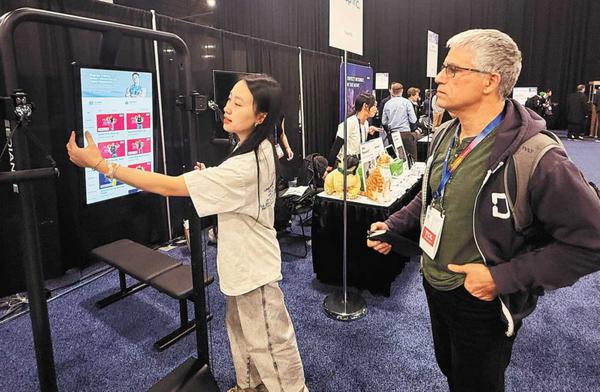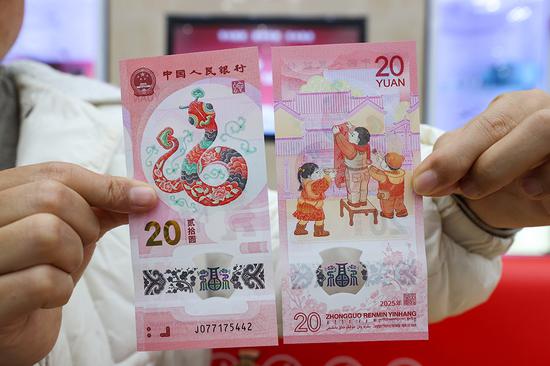
A Speediance team member demonstrates the use of "Gym Monster 2", the latest product from the Chinese smart home gym company, at the CES Unveiled preshow event on Sunday in Las Vegas. (LIA ZHU/CHINA DAILY)
Chinese health and wellness startups have showcased innovative products ranging from AI-enabled smart rings to innovative hearing aids at the Consumer Electronics Show in Las Vegas. Leveraging their technologies and competitive pricing, they are eager to establish a strong presence in the U.S. healthcare technology sector.
Elehear, a Shenzhen-based smart hearing aid company, exemplifies the trend with remarkable market performance. Jeffery Teng, the company's marketing manager, said sales in the final two months of 2024 surpassed the previous 12 months' figures.
The company strategically positioned itself to target the U.S. market from its inception, recognizing the strong demand and health awareness among U.S. consumers.
"While prescription hearing aids in the U.S. typically cost between $3,000 and $4,000, our over-the-counter solution is priced at just $399 per unit, offering a compelling value proposition," Teng said.
Elehear's device, designed for people with mild to moderate hearing loss, combines advanced hearing technology with artificial intelligence capabilities to enhance speech clarity in noisy environments. It is also capable of seamlessly switching between hearing aid and Bluetooth headphone functionalities.
Teng attributed the competitive pricing to what he called "Shenzhen speed" — the rapid pace of technological iteration in the Chinese tech hub. He said the company maintains complete control over its product development cycle, with in-house technology development and domestic manufacturing eliminating the need for outsourcing.
That approach enables the company to reduce the design-to-production timeline to less than a year, while maintaining frequent software updates, sometimes every week, Teng said.
Similar success stories are emerging from other Chinese health tech companies, such as RingConn, a wearable device manufacturer. Its second-generation smart ring, measuring just 2 millimeters thick and 6.8 mm wide, incorporates photoplethysmogram sensors, temperature sensors, and accelerometers to monitor various health metrics, including caloric expenditure, respiratory rates, heart rate, and sleep apnea.
Liu Mengmeng, RingConn's public relations manager for overseas markets, said the company's health data have been certified by Shanghai Ruijin Hospital. While currently marketed as a nonmedical device, RingConn is pursuing certification from the U.S. Food and Drug Administration.
The ring's distinctive feature is its improved battery life, achieved through the company's "eco power technology", which optimizes optical pathways and algorithms to reduce power consumption while maintaining performance.
"Our rings' batteries last 10 to 12 days, significantly outperforming competitors' five-to-six-day battery life," Liu said.
Since its establishment in 2020, RingConn has achieved remarkable market success. Its first-generation product, launched in 2022, has sold about 100,000 units, generating sales of about $13.7 million, with 60 to 70 percent coming from the U.S. market. The second-generation ring, priced at $299, generated $4 million in sales within just 45 days of its online launch, according to Liu.
The success of the startups reflects the growing strength of China's health and wellness sector. The robust domestic market has provided a strong foundation for overseas expansion, while Chinese companies' expertise in AI and other cutting-edge technologies enables them to develop innovative wellness solutions at competitive prices.
That competitive advantage is particularly relevant given the findings of a 2024 analysis by the digital health platform Calcium Health, which identified cost and financial constraints as major barriers to health tech adoption in the United States. The report highlighted opportunities for growth in areas leveraging AI and technologies that demonstrate clear outcomes and cost-effectiveness.
Speediance, a smart home gym manufacturer based in Shenzhen, has also capitalized on those market conditions. After two years in the U.S. market, the company has seen remarkable growth, with U.S. sales accounting for 60 percent of total revenue. Marketing manager Frank Han shared that the company's U.S. sales grew from $19 million in its first year to $47.8 million in 2024.
Just like Elehear and RingConn, Han attributed the company's success to both competitive pricing and product innovation. Its smart home gym equipment features characteristics such as a portable design, eliminating the need for wall-mounting, along with subscription-free access and frequent system updates.
"Our strong internet-iteration capabilities enable rapid software updates incorporating AI features, such as AI coaches providing personalized training plans," Han explained.
Speediance's agile development approach allows it to quickly respond to customer feedback, with accessory updates completed within one to two months and major machine parts updated within six months, Han said.


















































 京公网安备 11010202009201号
京公网安备 11010202009201号